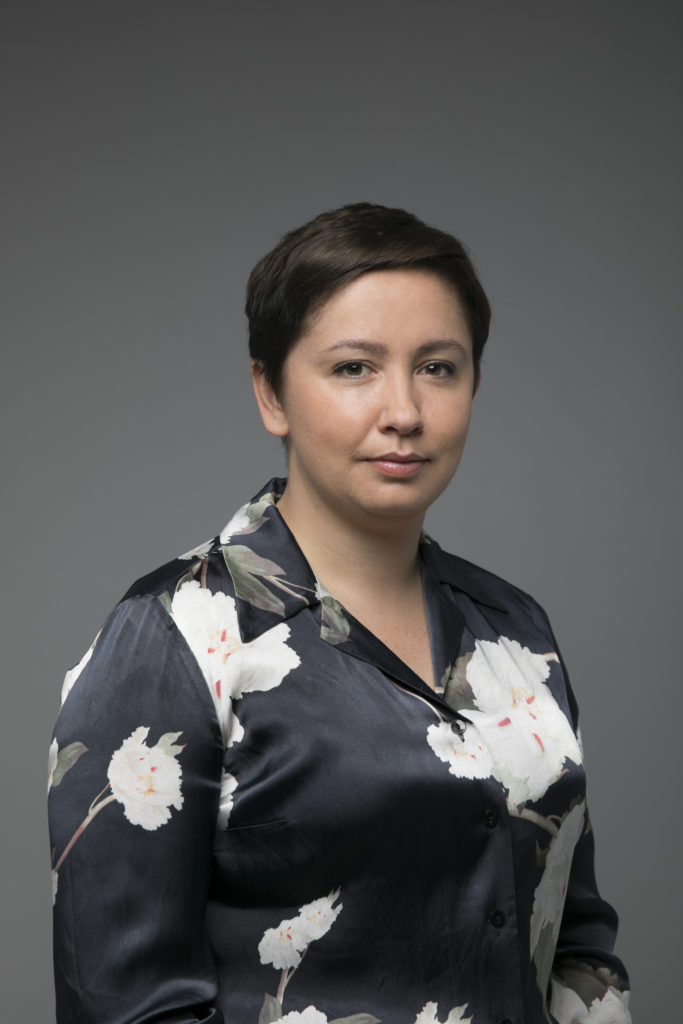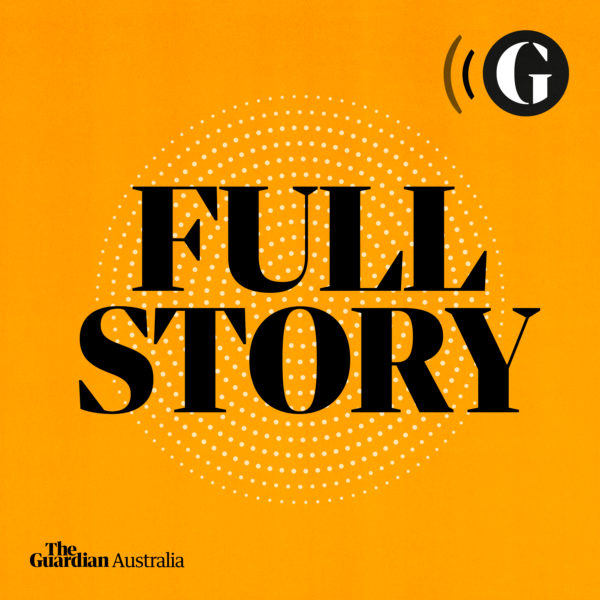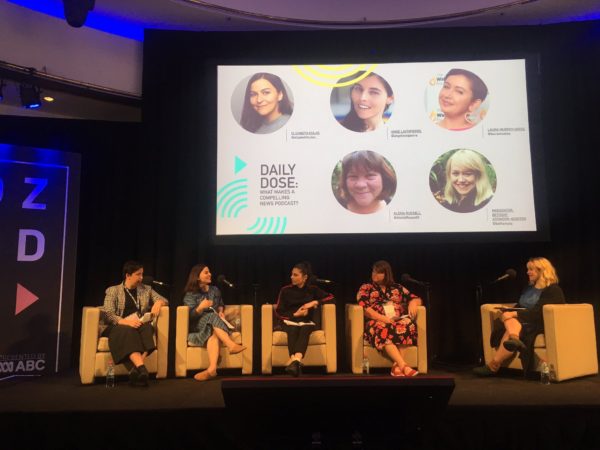Laura Murphy-Oates is the presenter and senior producer of Guardian Australia’s daily news podcast Full Story. Before that, she was a presenter on Triple J’s Hack, and a TV journalist at The Feed on SBS VICELAND.
She spoke to us about marrying daily news and audio documentary, and navigating the serious and the silly when it comes to news presenting.

What piece of audio has had the most profound effect on you – as a listener, as an audio maker or both?
One piece of audio I keep thinking about is in the first episode of Unravel‘s ‘Blood on the Tracks’, the ABC true crime podcast investigating the death of Mark Haines, presented and reported by Muruwari and Gomerioi man Allan Clarke. Allan was a senior reporter at NITV when I first started there, so I’ve always looked up to him, and was excited when this launched. This whole season was incredible, but there’s a few lines in the first episode that gave me chills. Allan talks about Gomeroi country, how it produces ‘fearsome warriors’ like Mark, and says that if Mark were alive today he would call him ‘uncle’. It’s just such a beautiful and powerful framing of this story and Allan’s connection to it, right from the start. This is what happens when we have Indigenous people telling our own stories.
Another small shout out to the Reply All episode ‘Today’s the Day’. It’s just so joyous and unexpected- possibly the most fun I’ve ever had listening to a podcast.
Where else do you find influence or inspiration for your work?
I think as a show, we take inspiration from all over- whether it is news podcasts like The Daily and our sister podcast Today in Focus, interview- led shows, or human interest storytelling. We’re not afraid to step outside of straight news, and create a bit of an experimental episode, that we think will bring people joy. That’s why you’ll see an episode about birds, and what they mean to us, followed by a deep dive on religious freedom laws.
Where do you work? And what tools help you the most?
Right now I work in my bedroom and my small, dark study/recording room. Sometimes I also listen to edits on walks around my local park!
 Where did the idea for Full Story come from?
Where did the idea for Full Story come from?
The initial idea for Full Story lies with Miles Martignoni, one of our Executive Producers, who lobbied for this show to get up at Guardian Australia (after producing incredible work for the Guardian like Breathless and The Reckoning). When myself and the rest of the team came on board, we spent a month or so in development to figure out what Full Story would sound like and finally landed on something that was more like an audio documentary, but turned around at record speed.
Some good examples of that style are this episode on Christchurch or this episode on the bushfires last summer. Of course not all of our episodes are that complex, because we would all pass out- some are a lot more straightforward.
What is your favourite part of making Full Story?
Hard to pick one thing, but I really love speaking to people all around Australia, especially in this pandemic where I’ve just been shut up in my house! I’ll spend one day talking to the reef scientist who discovered coral bleaching, the next to a young woman in public housing in Melbourne, and the next to a cafe owner in outback NSW. It’s really incredible and rewarding to be transported into so many people’s lives, and I hope that comes across in the podcast.
What is the biggest challenge working on Full Story?
I think staying timely while producing a captivating story. News moves pretty fast, so sometimes you’ve got to sacrifice something to get the story out!
What’s the best (or worst) advice you’ve received about podcasting?
This isn’t really ‘podcasting’ advice but more journalism advice. When I started out I think I thought being objective meant that I had to hold back on being empathetic, in order to look ‘professional’. But I’ve been lucky to work with a bunch of people (shoutout to former head of NITV news Malarndirri McCarthy) who showed me otherwise. When people share their stories with you, it’s a big deal, especially people who’ve been marginalised, so I’m constantly learning how to treat that with the respect it deserves.
As an audio maker, what have been your biggest lessons so far?
I went through a lot of voice training for TV that I basically had to unlearn for podcasting (credit to our producers Ellen Leabeater and Joe Koning for drilling it out of me). Podcasts are very different to live radio or TV, so keeping it natural and conversational, and not being afraid to sound ‘messy’ has been a big lesson.
I’ll spend one day talking to the reef scientist who discovered coral bleaching, the next to a young woman in public housing in Melbourne, and the next to a cafe owner in outback NSW.
Do you think the work you make reflects your personality? If so – in which ways?
I can be both very serious and very silly, and I think you hear this in the podcast. I’ve burst into tears in some of our episodes but I also can’t hold back a cackle, especially when our political editor Katharine Murphy makes a particularly cutting remark or a silly pun. It’s a rollercoaster.
If you could go out to dinner with any audio maker, who would it be – and what would you talk about?
One of the hosts of Reply All, PJ Vogt, was interviewed about his creative process and said something like ‘every story wants to be bad’, which is a line I whisper under my breath frequently when something is just not working out. I would love to unpick how they made some of their episodes over dinner and also just nerd out on storytelling.
What are you listening to at the moment?
Two series that I’ve been devouring are Floodlines by the Atlantic, and Resistance by Gimlet. I love good storytelling that addresses race in a nuanced way, and both of these shows deliver. For something lighter, I’ve also been listening to You’re Wrong About by Sarah Marshall and Michael Hobbes.

What’s your favourite Australian podcast, and why?
Unravel‘s ‘Blood on the Tracks’, for all the reasons listed in the first question and more! I’ve also finally started listening to Debutante: Race, Resistance and Girl Power by Nakkiah Lui and Miranda Tapsell, which is a strong contender.
What – if anything – do you think distinguishes Australian audio? What would you like to hear more of?
There’s a really strong contingent of Indigenous shows and presenters in Australian audio, with shows like Debutante, Pretty for an Aboriginal, Curtain, Unravel, Frontier War Stories, Take it Blak, Little Yarns, Awaye!, Race Matters and more. I don’t think this concentration and popularity of First Nations shows exists in the same way overseas, in places like the US (though I’m happy to be corrected). Regardless, this feels pretty special.
What’s next?
I took a month or so off the podcast recently to work on a special project related to Black Lives Matter. It will be coming out in print and on the pod soon – stay tuned!
Full Story is available to listen to here.